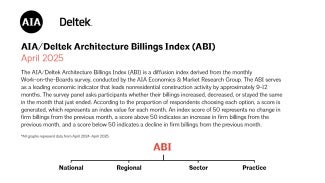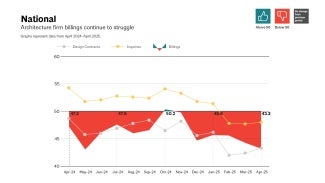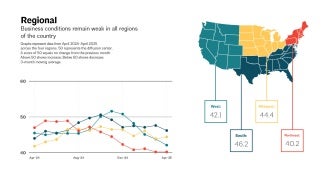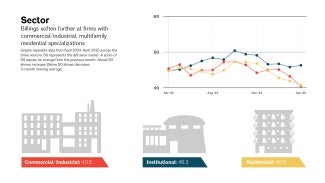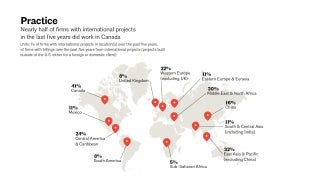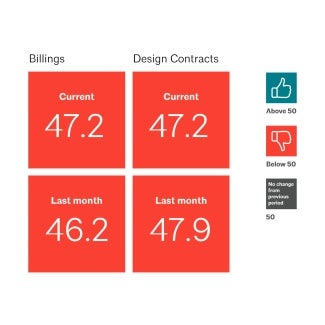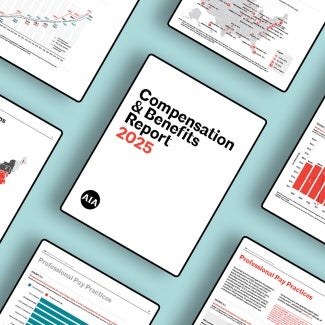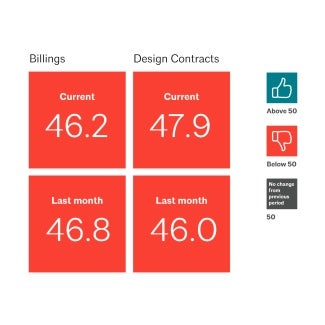ABI April 2025: Billings continue to decline at architecture firms
8% of architecture firms report billings from international projects in the last year.
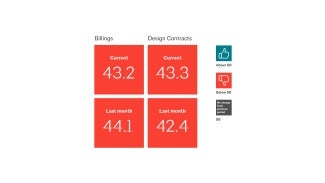
Architecture firm billings remained stagnant in April
The AIA/Deltek Architecture Billings Index (ABI) score declined to 43.2 for the month. Billings have declined for 28 of the last 31 months, since they first dipped back into negative territory following the post-pandemic boom. Despite generally strong backlogs at firms, inquiries into new work declined for the third consecutive month in April, while the value of new design contracts declined at the majority of firms for the fourteenth consecutive month. Although the U.S. economy is not officially in a recession at this time, many architecture firms are reporting recession-like business conditions.
Regionally, business conditions at architecture firms remained softest at firms located in the Northeast for the seventh consecutive month in April. Conditions have also softened significantly at firms located in the West since the beginning of the year. In addition, billings continued to decline at firms of all specializations this month, particularly at firms with commercial/industrial and multifamily residential specializations. The pace of the decline remains slower at firms with an institutional specialization, but billings have still declined nearly every month since mid-2023.
Conditions in the broader economy remain generally stable
Conditions in the broader economy have remained relatively stable recently. Nonfarm payroll employment grew at a steady pace, adding 177,000 new positions in April. Architectural services employment added 500 new positions in March (the most recent data available) but has been generally flat since August 2024. And while inflation ticked up slightly in April (increasing by 0.2%, following a decline of 0.1% in March), it rose by 2.3% on an annual basis, the slowest pace since early 2021. Grocery prices declined in April, although energy prices and the cost of eating out both increased. In addition, inflation has not yet shown any significant impacts from tariffs, some of which have now been rolled back or paused. However, Gross Domestic Product (GDP) decreased at an annual rate of 0.3% in the first quarter of 2025, following strong growth in every quarter of 2024. The decrease was led by increased imports, lower government spending, and lower consumer spending. Despite this, and based on current inflation trends and levels, it looks unlikely that the Federal Reserve will lower interest rates further before September at the earliest.
Fewer than one in ten firms report recent billings from international projects
This month, we asked architecture firms about their engagement with international projects (projects that will be built outside of the U.S., either for a foreign or domestic client) in recent years. Overall, 12% of responding firm leaders reported that their firm has had any billings from international projects over the past five years. The share was highest for firms located in the Northeast (16%), for large firms with annual billings over $5 million (23%), and for firms with institutional and multifamily residential specializations (14% of each).
Canada topped the list of project locations at firms with international projects in the last five years, with 41% of respondents reporting projects there. Nearly one third (32%) reported projects in East Asia and the Pacific (excluding China), followed by the Middle East and North Africa (30%), Central America and the Caribbean (24%), Western Europe (excluding UK) (22%), and China (16%). And at these firms with international projects in the last five years, more than two thirds (68%) reported that they currently have billings from international projects (or 8% of all firms overall), accounting for an average share of 5.9% of gross billings at their firm (including all offices) over the past year.
When asked about future plans for work on international projects, 15% of responding firm leaders expressed interest. Once again, firms located in the Northeast (21%) and large firms (28%) were most likely to anticipate that they would work on international projects in the future. For the more than three quarters (80%) of firms that do not have any plans to work on international projects in the future, the primary reasons were that their firm doesn’t want to deal with the potential headaches of international projects (48%), that their firm has no interest in international work (46%), and that their firm already has plenty of domestic work (43%). In addition, 36% of responding firms said that their lack of interest is because their firm doesn’t know how to pursue international projects, while 28% indicated that their firm doesn’t have the qualifications for international work.
- Join us for FREE at the next AIAU live webinar, Economic Update: Q4 2025 ABI Insights, on Thursday, November 6, 2025, at 2pm ET.
This month, Work-on-the-Boards participants are saying:
- “Economic uncertainty is leading to project delays and deferrals, as clients have questions about available funding and the ultimate cost of construction in a tariff-fueled materials environment.”—130-person firm in the West, institutional specialization
- “We have projects under construction, but not much work on the boards.”—1-person firm in the Midwest, commercial/industrial specialization
- “Interest in new work is picking up, but we do not expect to see notice to proceed until the third or fourth quarter.”—125-person firm in the South, residential specialization
- “Almost 40% of our contracted projects have officially gone on hold or are unofficially paused.”—20-person firm in the Northeast, mixed specialization
Join the ABI Work-on-the-Boards panel to participate in our monthly survey. Open to architecture firm owners, principals, and partners. All participants get a free ABI subscription.
The monthly AIA/Deltek Architecture Billings Index is a leading economic indicator for nonresidential construction activity.
Deltek is the home of AIA MasterSpec®, powered by Deltek Specpoint. Deltek helps A&E firms boost efficiencies while improving collaboration and accuracy.

